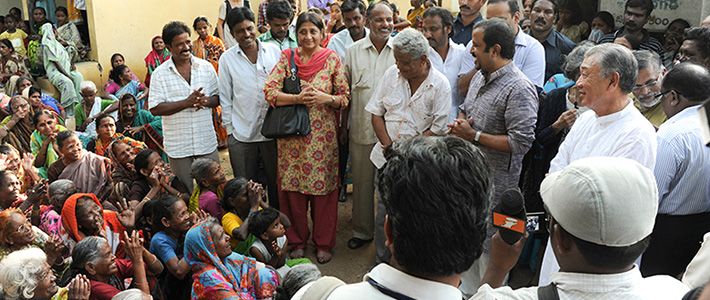
Japanese Efforts Continue to End Discrimination Against Leprosy
Society- English
- 日本語
- 简体字
- 繁體字
- Français
- Español
- العربية
- Русский
The Nippon Foundation, a Tokyo-based philanthropic organization, has been at the forefront of the global campaign to eliminate leprosy and also end the discrimination against those affected by the disease. The foundation has been partnering with the World Health Organization since the 1970s to advance measures to eliminate leprosy globally through treatment programs and other initiatives around the globe.
Deep-rooted Discrimination
Today leprosy is a highly treatable disease. With prompt diagnosis and a regimen of effective drugs, it is no longer the disabling malady it once was. Yet despite advances on the medical front, discrimination against those affected by the disease—even those who have made a full recovery—has persisted around the world.
This reflects the long history of social isolation forced upon patients affected by leprosy and their family members. Before the disease became curable, those infected by leprosy were often scarred and disfigured, and these people were treated contemptuously around the world. This discrimination stemmed from misconceptions about the disease, which is not highly infectious—in fact almost 99% of people are naturally immune to it.
Even today, discriminatory laws and systems remain, including many cases were people are denied the right to attend schools, hold employment, or get married. The task for eliminating leprosy involves not only the efforts on the medical front to eradicate the disease but also social efforts to put an end to the persistent discrimination.
Sasakawa Yōhei, chairman of the Nippon Foundation, in his capacity as WHO goodwill ambassador for leprosy elimination and the Japanese government’s goodwill ambassador for the human rights of people affected by leprosy, has sought to draw attention to this lingering discrimination. This effort has borne fruit, including the resolution unanimously adopted by the United Nations General Assembly in 2010 calling for the elimination of discrimination against persons affected by leprosy and their family members.
Words Have Repercussions
In order to overcome antileprosy discrimination, those active in the struggle to improve the lives of those affected by the disease have sought to counter misconceptions expressed by the media or by political and social leaders around the world. Sasakawa, for his part, has recently written open letters to draw attention to misleading statements or depictions regarding the disease.
On January 18, 2013, for example, Sasakawa wrote an open letter to the vice-chairman of Sony Pictures Entertainment to draw attention to an objectionable scene in the trailer for its movie The Pirates! Band of Misfits. The scene in question used the discriminatory term “leper” and showed a character affected by the disease whose arm suddenly falls off. In his letter, Sasakawa noted that such depicts end up “contributing to misunderstanding and fostering discrimination.”
More recently, on June 13, Sasakawa wrote a letter to newly appointed Pope Francis in response to comments the Catholic leader made a few days earlier in a speech to the Pontifical Ecclesiastical Academy. In his remarks, the pontiff warned against the dangers of careerism and compared it to “leprosy.”
In his letter, Sasakawa pointed out that the comparison of leprosy to careerism “draws on deeply ingrained negative stereotypes of leprosy and will reinforce discrimination against people affected by the disease and their families.”
While recognizing in his letter that it had certainly not been the Pope’s “intention in any way to reinforce the stigma against leprosy or to cause anguish to people affected by the disease,” Sasakawa noted that the comment was still likely to have a “big impact,” particularly in South America “where there are many Catholics and quite a few people affected by leprosy” and beseeched Pope Francis to be more sensitive in the choice of language given the “reach and influence” of his words. Sasakawa concluded his letter by offering thanks for the Vatican’s support provided for World Leprosy Day and saying that he looked forward “to working together with Your Holiness for a world without leprosy and its consequences.”
(Originally written in Japanese; photograph courtesy of the Nippon Foundation.)
Nippon Foundation Sasakawa Yōhei leprosy discrimination global cooperation Pope Francis WHO World Health Organization